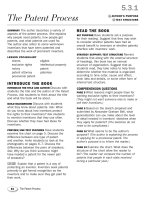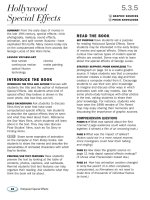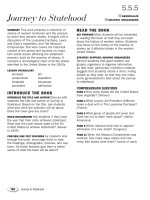3 5 2 living abroad (social studies)
Bạn đang xem bản rút gọn của tài liệu. Xem và tải ngay bản đầy đủ của tài liệu tại đây (4.93 MB, 14 trang )
Suggested levels for Guided Reading, DRA,™
Lexile,® and Reading Recovery™ are provided
in the Pearson Scott Foresman Leveling Guide.
Living Abroad
by Peggy Bresnick Kendler
Genre
Expository
nonfiction
Comprehension
Skills and Strategy
• Fact and Opinion
• Cause and Effect
• Text Structure
Text Features
•
•
•
•
Captions
Heads
Map
Glossary
Scott Foresman Reading Street 3.5.2
ISBN 0-328-13387-6
ì<(sk$m)=bd ihb< +^-Ä-U-Ä-U
Reader Response
1. Reread the section called Studying
Abroad. List three opinions from it.
Living Abroad
2. On a web like the one below, list the
four reasons described in this book that
Americans live in different countries. Look
Bresnick
Kendler
for cluesbyinPeggy
the way
the book
is organized.
Reasons Americans
Live Abroad
3. Think about the word abroad. Look at its
definition in the Glossary. What is your
explanation for how the word came to be
used this way?
4. How did the headings in this book help
you as you read?
Editorial Offices: Glenview, Illinois • Parsippany, New Jersey • New York, New York
Sales Offices: Needham, Massachusetts • Duluth, Georgia • Glenview, Illinois
Coppell, Texas • Ontario, California • Mesa, Arizona
Why Do Americans Live Overseas?
Every year many people move away
from the United States. Each year, about
250,000 people leave the United States
to live in foreign countries! Sometimes
people move overseas by themselves, but
other times, entire families move together.
Sometimes people from other countries
move to the United States and become
American citizens. But after living and
working in the United States for a while,
these new citizens move back to their
home countries.
Every effort has been made to secure permission and provide appropriate credit for
photographic material. The publisher deeply regrets any omission and pledges to
correct errors called to its attention in subsequent editions.
Many Americans move overseas each year.
Unless otherwise acknowledged, all photographs are the property of Scott Foresman,
a division of Pearson Education.
Photo locators denoted as follows: Top (T), Center (C), Bottom (B), Left (L), Right (R),
Background (Bkgd)
Opener: Tibor Bognar/Corbis; 1 Tibor Bognar/Corbis; 3 Lester Leftkowitz/Getty Images;
4 (B) Eric Curry/Corbis, (TR) Tibor Bognar/Corbis; 5 Corbis; 7 Robert Essel/Corbis; 8 Mark
C. Burnett/Photo Researchers, Inc.; 9 Jeffrey L. Rotman/Corbis; 14 Leif Skoogfors/Corbis;
16 (T) U.S. Army Corps of Engineers, Mobile District, (B) Victor M. Trisvan/AP/Wide
World Photos; 19 (T) David Gillison/Peter Arnold, Inc., (C) © United States Postal
Service. Trademarks and copyrights used herein are properties of the United States
Postal Service and are used under license to Scott Foresman, Inc. All rights reserved.,
(B) Paul Conklin/PhotoEdit; 20 Andres Leighton/AP/Wide World Photos; 22 Jeff
Greenberg/PhotoEdit
ISBN: 0-328-13387-6
Copyright © Pearson Education, Inc.
All Rights Reserved. Printed in the United States of America. This publication is
protected by Copyright, and permission should be obtained from the publisher
prior to any prohibited reproduction, storage in a retrieval system, or transmission
in any form by any means, electronic, mechanical, photocopying, recording, or
likewise. For information regarding permission(s), write to: Permissions Department,
Scott Foresman, 1900 East Lake Avenue, Glenview, Illinois 60025.
2 3 4 5 6 7 8 9 10 V0G1 14 13 12 11 10 09 08 07 06 05
3
Americans relocate to other countries
for many reasons. A person may take a job
overseas. High school and college students
may study in other countries. People who
serve in the military may be deployed to
another country to protect the United
States or to fight in a war. Other people
may move to help people in other
countries learn to live better lives.
Most often, Americans live in other
countries for a designated amount of
time and then return to the United States.
However, sometimes Americans like their
new homes so much that they decide to
stay in their new countries.
North America
When people live in other parts of
the world, they usually learn the native
language of the country in which they
live. They must learn the local customs
too. In a foreign country, daily life may
be unfamiliar at first because the food,
clothing, and weather can all be very
different, even exotic.
We all can learn about other countries
by reading or by watching TV programs.
Americans who move to other countries,
however, learn even more by experiencing
day-to-day life. They learn to understand
and respect the differences among people
from different cultures.
Europe
Asia
Africa
South America
Australia
4
5
Working Abroad
Today many Americans leave the United
States and relocate abroad for work.
Sometimes, there is a more interesting job
available in another country, or a job that
pays more money. Other times, a foreign
country is the only place where a person’s
career can thrive.
Many large companies have offices
all over the world. Sometimes Americans
who work for large companies may be
transferred to that company’s overseas
office. When this happens, the person’s
family often moves abroad too.
American artists, writers, and musicians
often move to other countries to work.
Settling in a new place and meeting
new people can spark creative ideas or
offer inspiration unavailable at home.
In foreign countries, artists can find new
scenes to paint and writers can find new
places to write about. Some musicians may
discover that their music is more popular in
countries outside the United States.
Some Americans are able to find
better jobs in other countries.
6
7
Scientists may need to work in other countries.
Scientists live where their research takes
them. Archeologists are scientists who
study ancient people and their cultures.
They learn about these people by studying
artifacts, such as tools and bones, that have
been dug up. Archeologists work at the
digging sites, which are all over the world.
Anthropologists are scientists
who study how other people live.
Anthropologists must live where the
people they are studying live so they
can understand that group’s way of life.
Anthropologists might live in the jungles
of South America, in the Sahara desert in
Africa, or even in Australia’s Outback.
8
Diplomats are government workers
who represent the United States abroad.
They work to build understanding between
the United States and the country where
the government has assigned the diplomat
to live and work.
Just as American students may learn
Spanish, French, or another language in
school, students in other countries may
learn English in school. American teachers
sometimes live in foreign countries to
teach English to children or adults. That
way, students in foreign countries such as
Japan, China, or France can learn English
from an English speaker.
Anthropologists study how other people live.
9
Studying Abroad
American students who attend school
in other countries are called exchange
students. An exchange student lives with
a host family while attending school. The
student lives in the family’s home. Usually,
a student from that foreign country lives
with a family in the United States and
attends school at the same time.
High school students can be part
of an exchange program.
10
Many exchange students study abroad
to learn another language. There are
plenty of opportunities for them to
speak another language while living
with a host family. Plus, the exchange
students have the opportunity to talk
with native speakers—those who have
grown up speaking the language. Students
understand that speaking a foreign
language with native speakers improves
their own skills.
Exchange students also learn about the
culture and customs of their host countries.
They experience holiday celebrations and
they get to try new varieties of food.
Although exchange students may miss
their families, they still usually enjoy living
and studying abroad. It is an adventure
that most high school students won’t have
unless they become exchange students.
These students often make new friends
while they are abroad, and they have
many new experiences to share with their
own family and friends upon their return.
11
Many American students go to college
after high school. Some choose to go to
college in the United States. Others attend
college in a foreign country. Some students
do both. They go to college in the United
States, but study in another country for
part of one year or for an entire year.
College students who choose to study
in other parts of the world usually enjoy
traveling, meeting new people, and
learning new customs. These students may
enjoy the adventure of living in another
country or learning a new language, but
they might also miss the United States.
Life is different for college students
studying abroad than for high school
exchange students, because college
students live in dormitories with other
students instead of in homes with host
families. College students are responsible
for attending school and deciding how to
spend their free time.
Sometimes adults go to school overseas
too. Schools in other parts of the world
may offer classes that aren’t found in the
United States. For example, if someone is
interested in the history of England, he or
she may be able to learn more about it by
living and studying in England.
College students may spend a year studying abroad.
12
13
Serving Abroad
Americans may travel to and live in
other parts of the world when they enlist
in a branch of the U.S. Armed Forces. These
Americans may go to other countries in order
to protect the United States.
When a member of the military is
assigned to work in another country, that
person becomes stationed in the country.
The person might be stationed there for
just a few months or for several years.
While stationed abroad, the member
of the military may request to be granted
leave. Requesting leave is similar to asking
for vacation, so the military member’s
superiors must approve the request.
If the United States is at war with
another country, members of the U.S.
military may be sent to the country in
which the war is being fought. Soldiers
undergo training beforehand so they can
defend themselves and fight in the war.
Then they travel overseas with a unit, or
group of other soldiers to fight.
Some members of the military live overseas
to serve and protect our country.
14
15
Some American military personnel live
overseas even when the United States is
not engaged in war. During peacetime,
members of the military often take their
families with them to live overseas.
American military personnel live on
military bases when they move abroad.
A base is a center of operations for the
military. The family of a military member
lives on the base too. The United States
has military bases in many different
countries around the world, including Italy,
Germany, South Korea, and Japan.
Military personnel, along with their
families, may move from base to base
throughout the world. Most bases
contain housing, schools, stores, hospitals,
restaurants, and recreation facilities.
Some military members and their
families move from base to base for many
years. Even though they serve the United
States, they don’t have a permanent home
in this country.
Military bases are all over the world.
Former President Bill Clinton visited
bases while in office.
16
17
Helping Abroad
Americans also move overseas to help
people in other countries. These Americans
are called volunteers. Volunteers are
people who spend time working, without
pay, to help others.
The Peace Corps is part of the United
States government, and it sends people
overseas to volunteer. Since 1961, when
the Peace Corps was founded, more
than 178,000 people have participated
by helping people in 138 disadvantaged
nations around the world.
Americans who join the Peace Corps
live and volunteer abroad for a period of
two years. Peace Corps volunteers come
from different backgrounds and have
various skills. They are placed in countries
where people are in need of such skills.
Peace Corps volunteers help in many
ways. Some volunteers help local people
start and run businesses. Others are health
volunteers who teach people about
healthy lifestyles.
Peace Corps volunteers help
people all over the world.
18
19
Education volunteers may teach English
to children or business people. Or they may
work with teachers in foreign countries to
help them improve their own skills.
Other Peace Corps volunteers help
people become better farmers. They also
improve communities by building roads,
wells, bridges, or schools.
Another group of Peace Corps
volunteers focuses on conserving the
environment. These people work with
park rangers to protect and conserve
endangered wildlife and teach people to
respect and care for the land.
Adults of any age can join the Peace
Corps, but most people who volunteer are
young adults. They usually go overseas
without their families and live in the
cities, towns, or villages of the people
they are helping.
Many famous Americans have spent
time working as Peace Corps volunteers.
One example is Jason Carter. Jason is the
grandson of Jimmy Carter, the thirty-ninth
president of the United States.
As you have read, many Americans live
parts of their lives in foreign countries.
They may work, study, serve in the military,
or volunteer abroad. These people like to
learn about other countries, languages,
cultures, and customs.
Volunteers move to other countries
to help the people living there.
20
21
Now Try This
You Are Moving Abroad!
In this book you’ve learned about some
of the reasons Americans move to other
parts of the world. You may even know
some Americans who have moved overseas!
Think about some reasons Americans
live in other countries. Today, you will
pretend that you are moving to another
country.
First, decide why you are moving. Is a
family member in the military? Has your
mother or father found work in another
part of the world? Are you going because
you have decided to go to school in
another country? Are you a volunteer? The
choice is yours!
to Do It!
w
o
H
s
’
e
r
He
On a separate piece of paper, make a
chart like the one below. On the left side
of the chart, write the questions. On the
right side, fill in your responses.
When you have completed the chart,
share your plans with a classmate.
WHERE are you going?
WHY are you going?
WHO will go with you?
HOW will you get there?
WHEN will you go, and
for how long?
WHAT will you do in
the new country?
22
23
Glossary
abroad adv. outside
your country; to a
foreign land.
ancient adj. of times
long past.
anthropologists n.
people who study
human beings,
dealing especially
with their fossil
remains, physical
characteristics,
cultures, customs,
and beliefs.
archeologists n.
people who study
the people, customs,
and life of ancient
times.
24
Reader Response
deployed v. to
spread out troops
into position for
combat action.
stationed v. having
been assigned a
station; placed.
transferred v.
changed or moved
from one person or
place to another.
volunteers n. people
who work without
pay.
1. Reread the section called Studying
Abroad. List three opinions from it.
2. On a web like the one below, list the
four reasons described in this book that
Americans live in different countries. Look
for clues in the way the book is organized.
Reasons Americans
Live Abroad
3. Think about the word abroad. Look at its
definition in the Glossary. What is your
explanation for how the word came to be
used this way?
4. How did the headings in this book help
you as you read?









